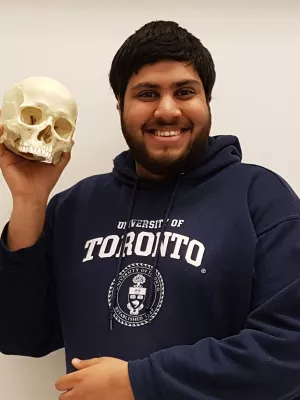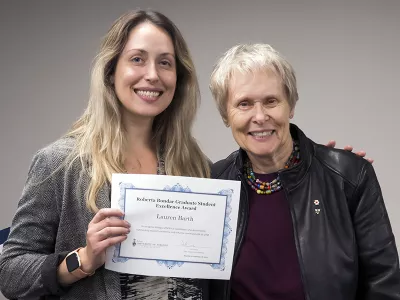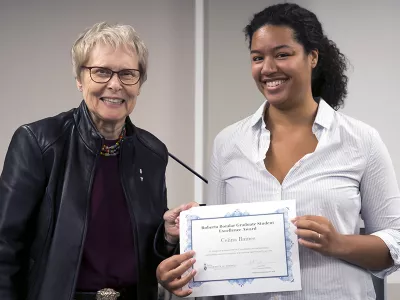On recommendation of the Department of Biology, University of Toronto Mississauga, the Roberta Bondar Graduate Student Excellence Award is to recognize outstanding Ph.D. candidate(s) at the Department of Biology who are UTM affiliated in honor of their demonstration of outstanding research excellence and positive contributions to extracurricular activities that enhance community life at UTM.
Winners:
2022

Matthew E. Bergman, PhD Student, Michael Phillips Lab
Matthew embodies all the qualities a graduate student should strive for: academic excellence, rigor, curiosity, integrity, reliability, and service. These qualities have resulted in an outstanding level of scientific output from him over the last few years, (...).
Matthew began his research career in Phillips Lab as an undergraduate in 2016. He quickly gained experience in mass spectrometry as his principal experimental technique to develop his thesis on essential oil biosynthesis in geraniums. He incorporated isotopic labeling and untargeted metabolomics techniques into his experimental repertoire and carried out a detailed phytochemical study on a natural population of rose scented geranium chemotypes. This was published in the prestigious Journal of Experimental Botany in 2020 and featured the first real time rates of essential oil biosynthesis. He was later award ‘Hottest paper of the year award’ for this publication. Using these natural plant chemotypes as tools, he next characterized geraniol (i.e. rose fragrance) biosynthesis in this group of plants with a biochemical approach supplemented with extensive analytics. This culminated in one of the first papers to demonstrate the involvement of a member of the Nudix hydrolase superfamily in terpenoid biosynthesis. These results were published in The Plant Journal, one of the highest ranking plant biology periodicals. That paper constituted his fifth first authored publication.
Although Matthew’s scholarly interests focus on plant secondary metabolism, he has also made an important contribution to primary metabolism using the model plant Arabidopsis thaliana. In 2020, Matthew published a new mass spectrometry based method to measure photosynthetic carbon assimilation. Appearing in the journal Plant Methods, this work identifies a close link between terpenoid metabolism and photosynthesis and further extends Matthew’s credentials in analytical biochemistry. He extended his work on Arabidopsis to develop a new chemical ionization method to survey central metabolism in conjunction with his established isotopic labeling methods. This paper, currently his sixth first-authored publication, is now in press in the highly prestigious journal Plant Physiology
His personal contribution to building productive collaborations with other labs within the UTM ecosystem is also noteworthy and indicative of his dedication to UTM graduate research. He has carried out mass spectrometry analysis for graduate students in the McMeans, Cheng, and Johnson labs within our department and for the Porter lab in Geography. The number of samples he has processed for our UTM collaborators are in the 1000s. As a collaborator, he assumes personal responsibility for all stages of analysis from data acquisition to number crunching to figure construction. He delivers a finished product that assists other students rapidly progress in their research and asks little in return. This is a service to other graduate students within our department that can rarely be found elsewhere and deserves recognition. I highlight his level of collaborative engagement here with other students as a typical example of his leadership, initiative, and work ethic.
Based on his remarkable output, Matthew has accrued a significant numbers of honors and awards. This began with recognition of his oral presentation skills with a ‘best talk’ award at the Cell and Systems Biology Graduate Research Symposium in 2018, held on the St. George campus. Following several travel and conference grants which subsidized various conference presentations, he received the UTM Biology award for ‘Hottest paper of 2020’ (awarded in 2021). The Department of Cell and Systems Biology further recognized his achievements with the Valerie Anderson Graduate Fellowship in 2021, a cash award of $2,500. His accomplishments were also recognized with an NSERC Alexander Graham Bell Canada Graduate scholarship (Doctoral).
(excerpts from the nomination package)
Ahmed Hasan, PhD student, Rob Ness Lab
Ahmed exemplifies the qualities this award seeks to recognize; research excellence and citizenship to the community at UTM.
Ahmed’s PhD research investigates the causes and consequences of recombination rate variation across the genome. He skillfully combines wet lab experimentation, computer programming and population genetic theory to examine patterns of DNA sequence variation across the genome.
Ahmed entered the CSB PhD program (without an MSc) 4.5 years ago and has published 7 papers, including 3 papers from his PhD with another under review. These PhD papers were published Genome Biology & Evolution (IF 3.5) , New Phytologist (IF 8.5) and Plant Cell (IF 9.6) - top journals in genomics and plant biology. He also has an 8th paper in review at Evolution
The productivity and impact of Ahmed’s work has allowed him to present at 8 conferences. His research success and communication skills have been recognized with awards such as the winner of the "Best Talk Award” at CSB Research Day and he was recently invited to speak at the International conference “Botany” in 2020.
Ahmed has been a leader in computational research at UTM and across U of T broadly. In the Ness Lab, Ahmed has acted as a mentor to three undergraduate students, imparting guidance in research and writing. He maintains the highest standards of reproducibility in computational research, publishing all his code and results publicly on the open platform GitHub and is a co-developer on“ROStools” - a toolkit for reproducible and open science.
Ahmed is a leader and citizen of UTM Biology and has a long list of real and substantial contributions to life at UTM. He is currently the president of U of T Coders and and continues to organize, run, and help teach weekly workshops to help reseachers improve their programming skills. He has hosted educational workshops on core skills in data analysis and visualization at UTM and been invited to run Python workshops by the UTM Library's Robert Gillespie Academic Skills Centre. In addition to these major contributions he has been an instructor in numerous other workshops with The Carpentries. Ahmed has been the active in student societies holding 6 posts in CSB, UTM Association of Graduate Students (UTMAGS) and UTM Biology Graduate Student Society - where he was president in 2018-2019. He also served on Seminar Committee and represented graduate students on the recent Microbiology Search Committee.
(excerpts from the nomination package)
2021
James Santangelo, PhD Student, Rob Ness & Marc Johnson Labs

James is a 5th year Ph.D. student, who has excelled in his PhD. James, an outstanding researcher, has also shown impressive leadership among his peers in the department, at the university and as a global scholar.
James has 11 peer-reviewed publications, and he is the lead author on eight of these publications. One of James’ publications from his PhD research received the Stephen Stearns Prize for the best graduate student research paper from the European Society of Evolutionary Biology and Journal of Evolutionary Biology. James has also published several perspective pieces that create a roadmap for future research in the field of urban evolutionary ecology.
In addition to research excellence, James has made significant contributions to the Biology
Department. James was the co-president of the Biology Graduate Student Society (BGSS), where he organized events for graduate students in the department, including the annual BGSS retreat, seminar series, and various recreational activities. James also served on the Biology Seminar Series, the Biology Executive Committee, and several chair and faculty searches. Lastly, James created and ran bi-weekly graduate student programming workshops. These workshops were freely available for any graduate student in UTM who was interested in learning about coding in various computer languages (R, python, bash, etc). Along with organizing and leading these workshops James also dedicated weekly drop-in sessions to help any student who had questions about coding. (excerpts from the nomination package)
2020
Ruth Lillian Rivkin, PhD student, Marc Johnson Lab

Ruth has established herself as an emerging leader in the field of evolutionary ecology, evidenced by the papers she has published, talks and posters she has given, and awards she has received. In terms of extracurricular contributions, Ruth served as the President of the UTM Biology Graduate Student Society during 2016 and 2017. She was also a member of the Biology Executive Committee, and served as the Treasurer of the University of Toronto Mississauga Association of Graduate Students. In 2018, she co-organized an international symposium at UTM. Ruth has played a leading role in improving the mental health and wellness of graduate students at UTM. Her advocacy and action on this important subject began in September 2018 when she served the Student Advisory Committee for the Health and Counseling at UTM. It was at this time that she also founded and began to lead “Path to Resilience”, a graduate student peer support group. As the organizer of this group she led weekly peer support meetings for graduate students focusing on mental health and wellness of student, which included monthly workshops with counsellors on health and wellness. This has been an incredibly important initiative that has had a large positive impact on increasing the well-being of our graduate students.
Arjan Banerjee, PhD student, Sasa Stefanovic Lab

Arjan has developed a very exciting research project working on problems of organellar genome evolution in plants in general, and in particular on plastid evolution in heterotrophic plants. Arjan has an outstanding ability to do lab and analytical work, but he is equally motivated and prolific when it comes to publications. His first paper on the parasitic genus Cuscuta was published
relatively early on in his career and in a very good journal (Plant Molecular Biology), with the reach well beyond the plant systematics community. Earlier this year Arjan was asked to provide a dispatch, an invited opinion piece, for the Journal of Experimental Botany on the topic of plant-to-plant communication via parasitic bridging. At an early stage of career, this is a rare honour, not frequently extended to many postdoctoral fellows let alone graduate students.
Arjan served in 2017-2018 as the President of UTMAGS and worked to improve the UTM graduate student experience, to represent graduate students effectively in governance, and to design programming aimed at providing grads with opportunities to develop themselves professionally and to foster cross-departmental interaction. He was a voting member on the UTM Campus Affairs Committee (2017-18) and on the UTM Campus Council (2018-19), as well as on the search committee established by the Principal for the position of Chief Administrative Officer (2017-18). In the biology department, he served on the seminar sub-committee (2016-18) and on the curriculum committee (2016-17). His involvement in the graduate community was recognized with the UTM Graduate Student Leadership Award in 2018. Arjan has volunteered 242 hours with Let’s Talk Science (LTS) since 2015. Since 2017, Arjan has been the lead organizer for Mississauga’s chapter of Science Rendezvous, Canada’s largest science festival held in May every year.
2019
Lauren Barth, PhD Student, Gary Sprules Lab

Lauren completed her BSc at UTM in 2012 and graduated with high distinction. Her senior thesis, partly funded by an NSERC Undergraduate Research Award, was a field study combining traditional plankton sampling with acoustics technology to document seasonal changes in the daily vertical migration of the larval stages of a predatory aquatic midge. The research was published in the Canadian Journal of Fisheries and Aquatic Sciences and Lauren also received a UTM Dean’s Award for Research Excellence.
She is now close to finishing her PhD thesis in which she is testing the utility of a relatively new index of plankton community size structure as an indicator of the integrity of Ontario’s lake ecosystems. This work is based on data from the Ontario Ministry of Natural Resources and Forestry’s Broad-Scale Monitoring Project. She has already published two papers from her PhD project and will soon submit a third. She was awarded an Ontario Graduate Scholarship in partial support of this research.
Lauren doesn’t only do research. She has been a TA in the Biometrics courses through most of her graduate career and has become a statistical mentor for Biology students in general. She has also given generously of her time to supporting graduate initiatives on campus, including co-founding an organization to help grad students and post-docs deal with the mental pressures of advanced education; working with the Career Centre as a Director of the UTM Association of Graduate Students to run workshops for enhancing professional networking skills of graduate students; improving on-campus graduate housing through her work on the UTM Student Housing Advisory Committee; and on the UTM Residence Life Committee to help undergrads learn what graduate work is all about.
Celina Baines, PhD Student, Shannon McCauley Lab

